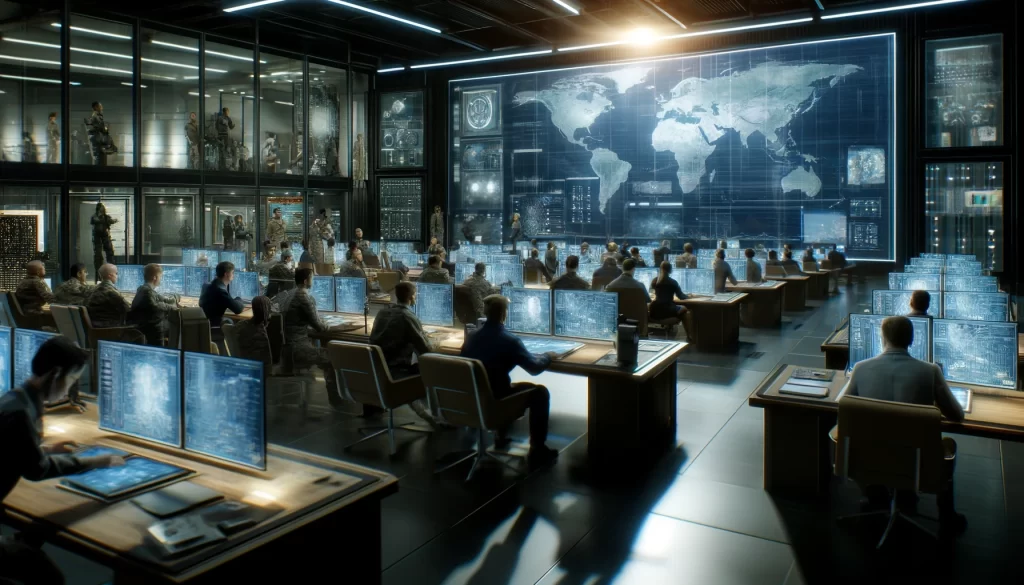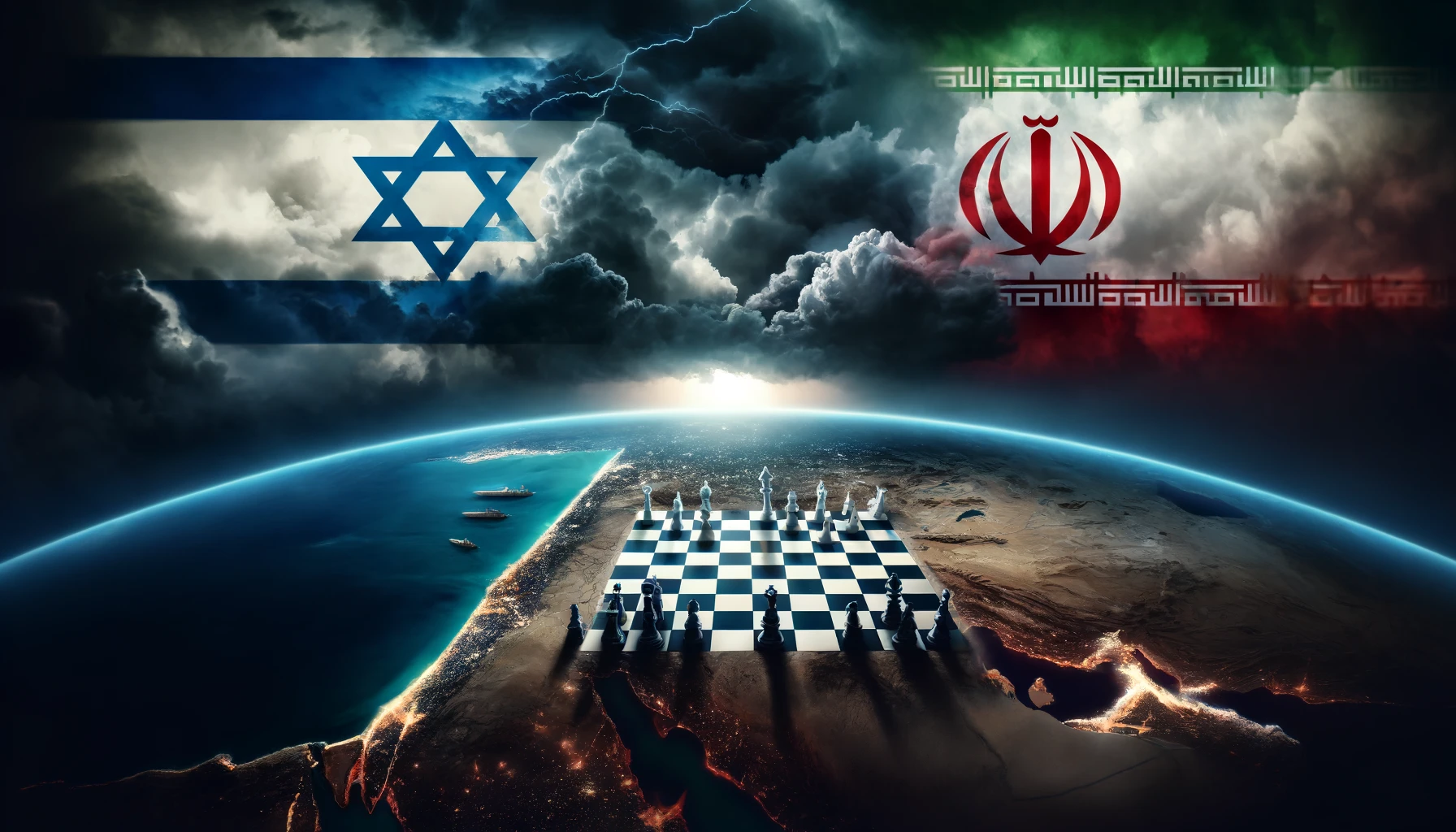Late Thursday, Israel carried out a missile attack on Iran, in response to an earlier attack by it on Israel that occurred on Sunday. The action by Israel was exactly what it had warned would happen, despite efforts by leaders from Western countries to prevent such a response.
A high-ranking official from the U.S. military confirmed to NPR that the Israeli forces did indeed strike Iran with missiles. However, details about the attack are still limited. Both Iran and Israel did not heavily publicize the incident Friday morning, which analysts believe is a move aimed to reduce tension in the region.
Retired U.S. Central Command Commander Gen. Frank McKenzie commented on the situation, saying, “This is a very dangerous moment, but I think Israel has done about as intelligent a thing as they can do under this circumstance. No one knows exactly what happened and maybe, just maybe, we’ll avoid any possibility of significant escalation as a result of it.”
The details of the attack remain unclear. Iran’s state news agency IRNA reported that loud sounds in Isfahan, a central city in Iran, were due to air defenses intercepting a “suspicious target.” There was no damage reported in the area. Notably, Isfahan hosts several military installations, including the country’s largest nuclear research complex. The International Atomic Energy Agency verified that these nuclear sites were not harmed.
Additional incidents were reported in Iraq and Syria. According to Syria’s state-run SANA news agency, Israel targeted air defense sites in the southern region of Syria, causing “material damage.”
In response to these developments, world leaders have urged both sides to de-escalate the conflict and continue seeking a ceasefire between Israel and Hamas to prevent a broader regional conflict.
Trita Parsi of the Quincy Institute for Responsible Statecraft told NPR’s Morning Edition that Iran’s low-key reaction to the strike might be an attempt to sidestep the retaliation it had threatened if Israel attacked. Parsi cautioned, “Given the circumstances of where we are, this could have turned out much worse. But it’s not over yet, so we shouldn’t draw too big of a conclusion quite yet.”
Both Israel and Iran have reacted quietly to the missile strikes. In Iran, state television made light of the situation, and there were humorous reactions on social media. Iran also halted flights across the country for a brief period, but they were resumed on Friday morning.
In Israel, the Home Front Command System, which alerts civilians about threats, did not increase its threat level. Flight operations continued normally, except for the German airline group Lufthansa, which announced a temporary suspension of flights to Israel and Iraq until at least early Saturday due to the “current situation.”

Israeli leaders have mostly remained silent after the attack, following a gag order, except for a few instances. Itamar Ben-Gvir, Israel’s national security minister, criticized the attack as “weak” in a tweet. This comment was picked up by Iranian state-affiliated news agency Tasnim, which mocked Israeli authorities. Yair Lapid, an Israeli opposition leader, condemned Ben-Gvir’s tweet as “unforgivable,” stating that it had caused embarrassment for Israel from Tehran to Washington.
The controversy over Ben-Gvir’s tweet highlights the intense debate within Israel and internationally about how Israel should respond to Iran’s initial attack, marking the first such assault launched from Iranian soil.
Events Leading Up to the Current Situation
The recent events leading to tensions between Israel and Iran stem from a series of actions and reactions in the Middle East. It all began when Hamas launched an attack on Israel on October 7, resulting in the deaths of around 1,200 people and around 250 individuals being held hostage by Hamas. Subsequently, Israel conducted military operations in Gaza, resulting in the deaths of more than 34,000 people, according to health officials in the territory.
Iran’s involvement in the conflict is significant. It supports three key militant groups: Hamas, Hezbollah (engaged in conflict with Israel along its northern border with Lebanon), and the Houthis, who have targeted international commercial vessels in the Red Sea in recent months. Additionally, Iran backs the regime of Syrian leader Bashar Assad, allegedly using Syria to transport weapons to Hezbollah. Earlier this month, Iran accused Israel of bombing its Consulate in Damascus, resulting in the death of at least seven officials, although Israel neither confirmed nor denied responsibility for the attack.
In response to these developments, Iran launched hundreds of drones and missiles towards Israel on Sunday, with most being intercepted with the assistance of the U.S., U.K., France, and Jordan.
Reactions and an Outlook
Israeli Prime Minister Benjamin Netanyahu faces pressure from both far-right members of his war cabinet, urging swift and decisive action against Iran, and from Western leaders, advocating caution to avoid a broader regional conflict. General Frank McKenzie believes Israel managed to convey a message to Iran that it can respond proportionately without over-escalating tensions.
As for the United States, Secretary of State Antony Blinken emphasized the importance of de-escalating tensions during a meeting of G7 nations in Italy. President Biden announced a fresh round of sanctions against Iran earlier in response to the weekend attack, aiming to increase economic pressure on Iran and curtail its “destabilizing” military programs.
Various world leaders, including those from China, the U.K., Russia, and Australia, have called for de-escalation and a cease-fire in the Israel-Hamas conflict. Egypt and Turkey have expressed deep concern over the escalating situation, with Egypt urging the highest levels of restraint and Turkey placing blame on Israel for the attack on the Iranian Consulate. European Union’s chief diplomat, Josep Borrell, emphasized the need for restraint from both sides to prevent the region from sliding into a full-scale war, warning of potential devastating consequences for the entire region and beyond. U.N. Secretary-General António Guterres echoed similar sentiments, urging the international community to work together to prevent further escalation and mitigate the potential catastrophic consequences for the region and beyond.
This article is based on the following article:
https://www.npr.org/2024/04/19/1245838551/israel-iran-attack

Background Information
Understanding these elements can help readers grasp the complexities of the conflicts discussed in the article, why they matter, and how they affect global stability. This background knowledge serves as a foundation for understanding current and future events in the region.
- Middle East Geopolitics: The Middle East is a region that spans parts of North Africa and Western Asia. It is strategically important due to its vast oil reserves and its location at the crossroads of continents. The area has a long history of conflict due to political, religious, and territorial disputes.
- Israel and Iran: These two countries are key players in Middle Eastern geopolitics but have no formal diplomatic relations and are often seen as adversaries. Israel is a country in Western Asia, established in 1948, known for its significant Jewish population. Iran, formerly known as Persia until 1935, is an Islamic Republic established in 1979 after the Iranian Revolution, which led to the overthrow of the Shah (monarch) in favor of an Islamic regime.
- Hamas: Hamas is a Palestinian Sunni-Islamic fundamentalist organization, which has governed the Gaza Strip since 2007. It is known for its conflict with Israel and is considered a terrorist organization by Israel, the United States, and the European Union, among others. Hamas’ stated aim includes the establishment of a Palestinian state and the elimination of Israel.
- Hezbollah and Houthis: Hezbollah is a Shiite Islamist political party and militant group based in Lebanon, supported by Iran. It has been involved in conflicts with Israel. The Houthis are a rebel group from Yemen, also supported by Iran, and are part of the ongoing Yemeni Civil War. They have conducted attacks on international shipping and Saudi Arabian targets.
- Syrian Civil War: This conflict began in 2011 as part of the wider wave of 2011 Arab Spring protests. It has involved multiple countries and groups, including the regime of Bashar Assad, various rebel factions, ISIS, and international powers. Iran supports the Assad regime, while Israel has conducted strikes in Syria, aiming to prevent Iranian military supplies from reaching Hezbollah.
- International Relations and Military Actions: The article mentions drone and missile attacks, which are modern warfare tactics used to carry out strikes over long distances without manned aircraft. This type of warfare is increasingly common in conflicts involving state and non-state actors.
- International Responses: Countries often react to conflicts through diplomatic means, such as sanctions, or through direct or indirect military support. Sanctions are penalties applied by one country or a group of countries against another to stop it from acting aggressively or to punish it. The G7 (Group of Seven), mentioned in the article, is an organization of countries with some of the world’s largest economies, which discuss and cooperate on international issues, including security.

Debate/Essay Questions
- Is Israel’s military response to the attacks by Iran and its proxies proportionate and justified, or does it escalate the conflict unnecessarily?
- Should external powers like the U.S. and European nations intervene in conflicts in the Middle East, or should they allow regional powers to resolve their issues independently?
Please subscribe to Insight Fortnight, our biweekly newsletter!
